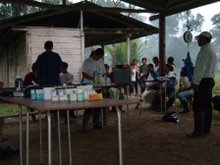First off, watch this shocking video to learn more about the impact of the global water crisis:
Beyond Scarcity: Power, Poverty, and the Global Water Crisis
I just read an interesting article written by Dr. Vandana Shiva, author of the book Water Wars. The article exposes water theft (hydropiracy) by large corporations like Coca-Cola, water privatization by the World Bank (in an effort to shift from "social to commercial value"), and other scandals like rerouting rivers to maximize land use (consider the World Bank-supported River Linking Project in India). I never thought of water as a commodity subject to theft! But theft is indeed occurring, and it reminds me of a poignant point made by presenters in our last class who compared our current battle over oil to the possibility of a war over water rights & access. Facing the prospect of water scarcity makes the oil crisis seem laughable.
The article also discusses public-public partnerships (PUP's). Private multinational corporations like the Suez Group--which made over a billion dollars in profit last year--have unfortunately failed to deliver improvements in water access in countries worldwide (e.g Argentina, Bolivia & Tanzania). Public-private partnerships can apparently leave a country with less water and more debt than they had to begin with. The concept behind PUP's is simply to shut out the for-profit sector by forming partnerships that include public authorities, donor governments, international organizations, NGO's, trade unions, and communities/local actors.
As we talked about in class, water is a basic human right, and when that's the case, the onus falls on the public sector. Privatization can indeed help, but in the case of water, taking into account the private sector's failures and the extreme urgency of water needs in developing countries, should PUP's be considered instead?
Check out this article on PUP's worldwide to learn more about their current role and possibilities for the future: "Public Water For All"
Among currently employed, successful PUP's in national water distribution (taken from the above article, and originally described in the book Reclaiming Public Water):
-Public-collective partnership in Cochabamba (Bolivia): democratic control over the public utility SEMAPA (via citizens elected onto the company’s board) and a strong role for local water committees in distributing bulk water supplied by SEMAPA to the unconnected periurban areas.
- Community-utility partnership in Savelugu (Ghana): Ghana Water Company delivers bulk water to the community, who run the next stages of water delivery; planning, tariff setting, new connections, maintenance and billing.
- Public-Workers Partnerships in the province of Buenos Aires (Argentina): a worker’s cooperative manages the public water utility ABSA, consulting closely with public authorities and water users.
- Communitarian water delivery in Venezuela: local communities, the water utility and elected officials co-operate in communal water councils to identify needs and priorities for improvements, allocate available funds and develop joint work plans.
There are definitely barriers to implementing PUP's, but it seems like there is also strong evidence that they could be the answer to establishing water democracies.
Subscribe to:
Post Comments (Atom)





3 comments:
Farah,
Excellent post!! Thank you for the examples of PUPs.
What did you mean by "Public-private partnerships can apparently leave a country with less water and more debt than they had to begin with"? That confused me...
mana,
i think the way i wrote it was confusing. privatizing a water supply like a river or groundwater can take the rights of the water away from the community. then the private companies who bought the rights can sell it back, perhaps even with a tariff. that's one way.
then the people are in debt and the water which used to be freely accessible is no longer theirs...in cases of water theft that the shiva article mentioned, the situation might end up even worse.
dr. shahi posted a good article on blackboard to give a more balanced view of the positive potential of public private partnerships. that article can be found here: http://www.uneca.org/chdcs/chdcs3/ppps_chdcs_3.pdf
Interesting analysis of PUPs... thanks for the information.
One thing that I think is pivotal in the success of any PUP's assistance is to make sure that individuals or entities from the specific region or locale receiving assistance has some sort of voice. Interesting to note how most of the examples you mention use co-operation between representatives giving and representatives receiving water... Indeed, I think the idea of water "democracy" is a promising one...
Post a Comment